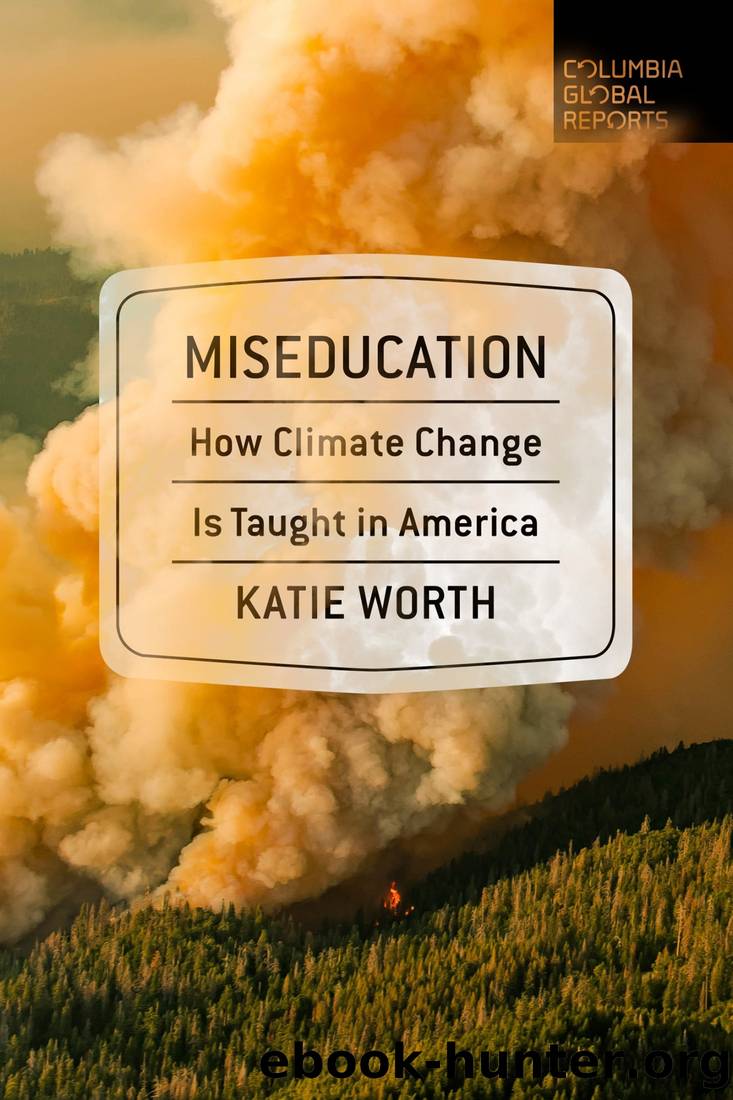Miseducation by Katie Worth

Author:Katie Worth [Worth, Katie]
Language: eng
Format: epub
Published: 2021-11-15T00:00:00+00:00
Selling Kids on Fossil Fuels
One early spring day I was sitting in the science department of an Arkansas middle school when a representative of the stateâs oil and gas industry walked in. She was there to talk to the seventh graders.
Her name was Paige Miller, a petite blonde with a short shag-cut and big silver jewelry. She told me she ran Arkansas Energy Rocks!, an initiative of the Arkansas Independent Producers & Royalty Owners, which describes itself as âthe voice of Arkansasâs oil and natural gas community.â Twenty attentive tween faces watched as she cued up a PowerPoint presentation.
Arkansas, she told the students, had the good fortune of being an energy state. She described the layer cake of earth and minerals under the studentsâ feet and pointed to diagrams showing which of those layers are soaked in fuel. She showed them pictures of the technology that sucks that fuel out. Twenty-five of the stateâs seventy-five counties produce either oil or gas, and some 33,000 people are employed in that production. Arkansas is a landlocked state, but some Arkansans even work on offshore oil rigs, she said. They fly to the rigs on helicopters, work for two weeks, then get two weeks off.
âDoes that seem like a good schedule? Half time?â she asked the students.
âMm-hmm!â the kids chorused.
âSo how much do they pay you?â asked one student.
âThe average starting salary on an offshore drilling rig is $100,000 a year,â Miller said.
âWow!â whispered another student.
âFossil fuels have been very important to mankind,â she said, and launched into a list of ways that that is true. She showed the students a pie chart of the nationâs energy sources. Fossil fuels made up the majority of the pie. Each renewable energy source comprised a slim slice. But using fossil fuels comes at a cost, she told the students. âThe problem with fossil fuels is carbon emissions,â she said, without elaborating on the nature of that problem. âBut somebodyâs going to have a problem with all of these energy sources,â she said. âGeothermal power works well but itâs expensive. Wind power a lot of people donât like because they say it kills birds. A lot of people donât like hydropower because they say we shouldnât be damming up bodies of water. With solar, if thereâs a tornado, what happens to the solar fuel?â
âIt goes away,â the students said.
âYouâre going to find a problem with any one of these sources.â
As for the carbon problem, thereâs not much the US can do about it, she said. âIf the United States shut down all fossil fuel usage tomorrowâall of itâthe difference it would make in terms of global warming is 0.01 percent,â she said, inaccurately. She did not define global warming, but then presented a dark scenario of what might happen if we address it. âThere are actually 1.2 billion people on the continent of Africa and the country of India who live every day without electricity. Now think about thatâwhat your life would be like without electricity. You donât have a refrigerator in your house full of good food being cooled properly.
Download
This site does not store any files on its server. We only index and link to content provided by other sites. Please contact the content providers to delete copyright contents if any and email us, we'll remove relevant links or contents immediately.
Navigation and Map Reading by K Andrew(4550)
Spare by Prince Harry The Duke of Sussex(4188)
Tuesdays with Morrie by Mitch Albom(3830)
Cracking the GRE Premium Edition with 6 Practice Tests, 2015 (Graduate School Test Preparation) by Princeton Review(3593)
What It Really Takes to Get Into Ivy League and Other Highly Selective Colleges by Hughes Chuck(3217)
Goodbye Paradise(2951)
Never by Ken Follett(2873)
Pledged by Alexandra Robbins(2789)
Kick Ass in College: Highest Rated "How to Study in College" Book | 77 Ninja Study Skills Tips and Career Strategies | Motivational for College Students: A Guerrilla Guide to College Success by Fox Gunnar(2717)
A Dictionary of Sociology by Unknown(2516)
Graduate Admissions Essays, Fourth Edition: Write Your Way into the Graduate School of Your Choice (Graduate Admissions Essays: Write Your Way Into the) by Asher Donald(2473)
Sapiens and Homo Deus by Yuval Noah Harari(2406)
Get into Any College by Tanabe Gen Tanabe Kelly(2382)
Zero to Make by David Lang(2344)
The Social Psychology of Inequality by Unknown(2305)
Machine Learning at Scale with H2O by Gregory Keys | David Whiting(2269)
500 Must-Know AP Microeconomics/Macroeconomics Questions(2239)
Fairy Tale by Stephen King(2059)
Will by Will Smith(2033)
